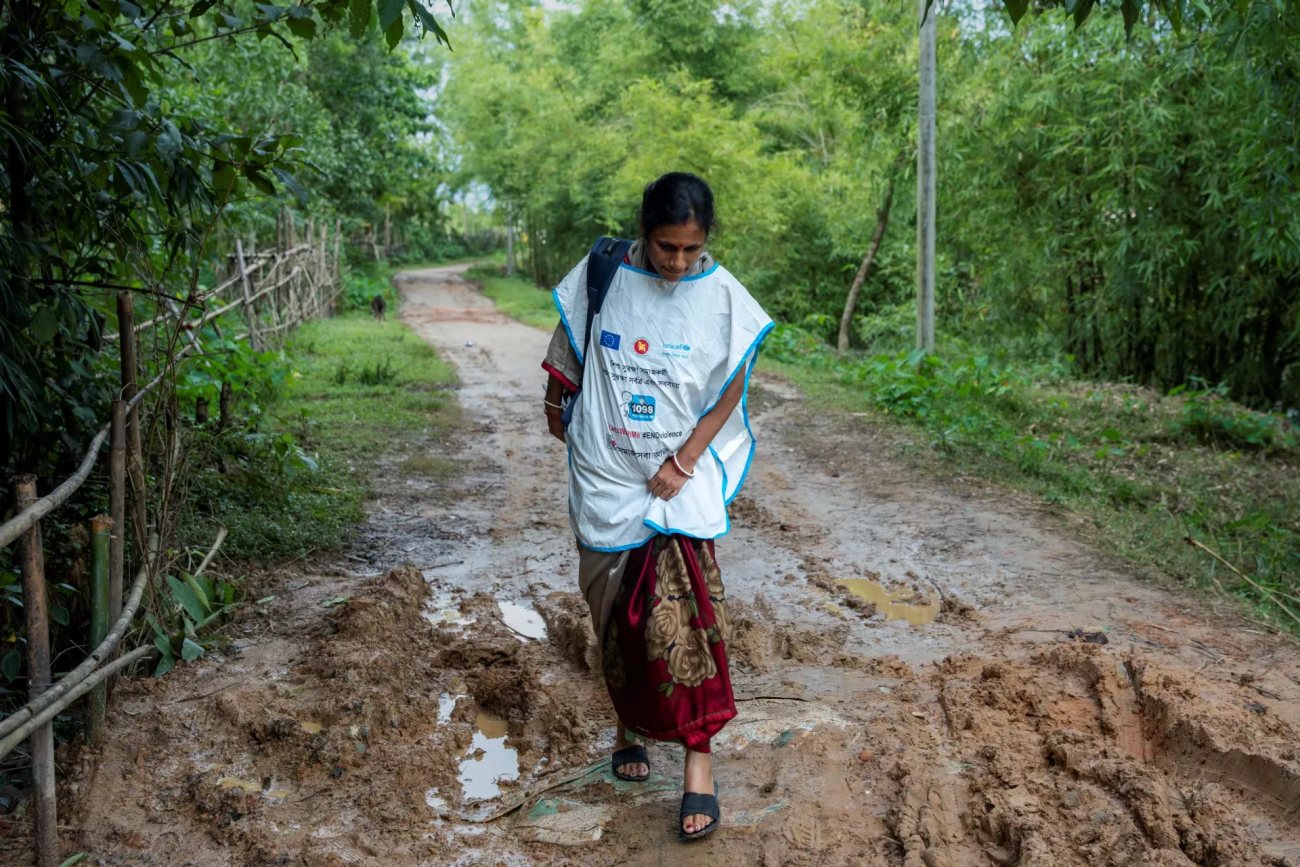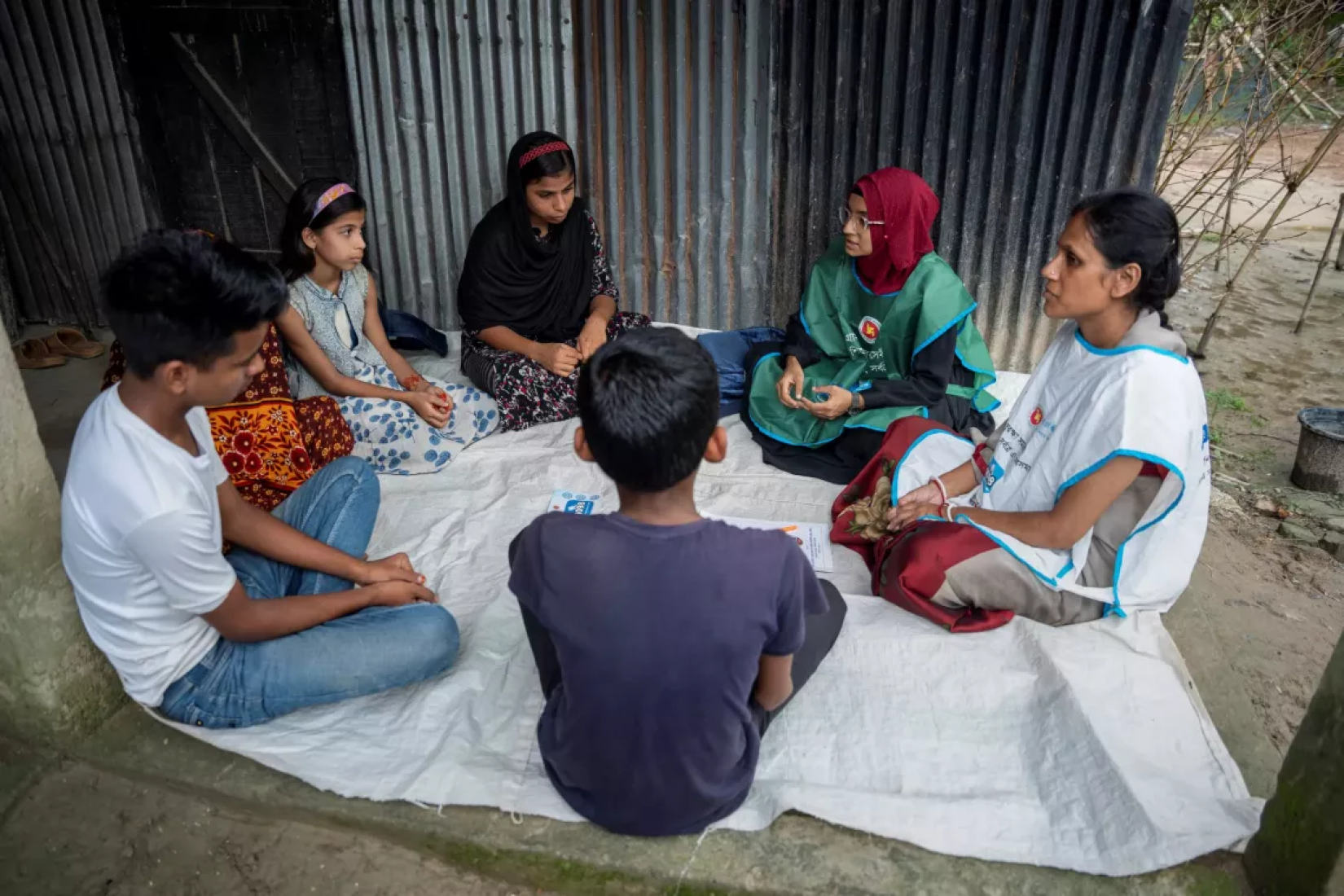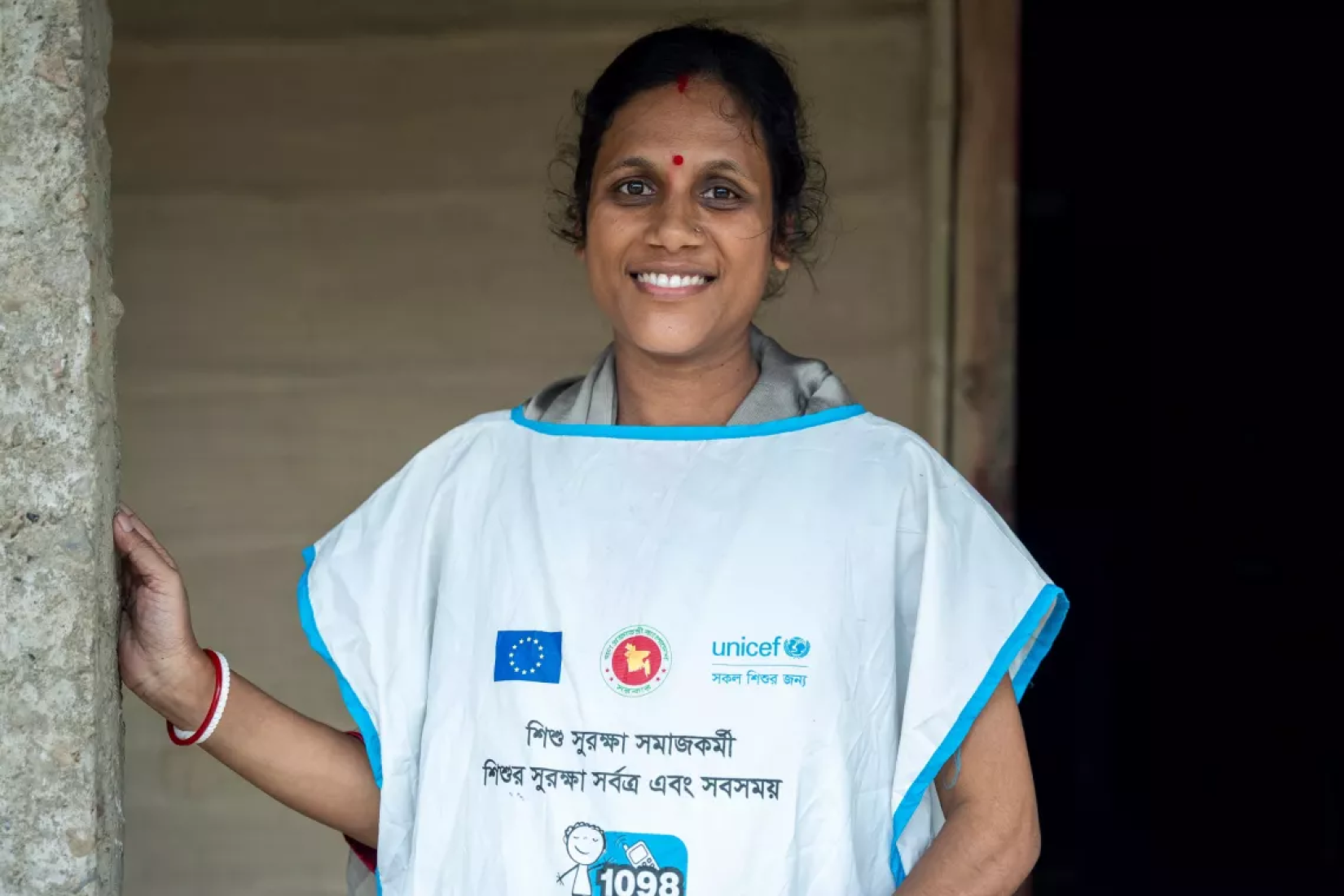“I want to care for every child like I do for my child.”

Despite challenges, six-month-pregnant social worker Arjona delivers emergency support to children and families hit by floods in northeastern Bangladesh.
25 September 2024
Sunamganj, BANGLADESH – The village road sprawls like quagmire under pallid sunlight. Floodwaters have receded, leaving behind wet silt patches and puddles of stagnant water. Black slippers squelching at every step, Arjona Rani, finds her way on muddy ruts to visit children and families recently hit by the floods.
At six months of pregnancy, she is exhausted. But the UNICEF-supported Child Protection social worker doesn’t want to end the working day just yet. Her job under the Department of Social Services is her passion.
“As a mother myself, I want to care for every child the way I do for my own child,” Arjona shares.
The air is thick with mixed scents of wet soil and decayed leaves. The rain may come again, and everyone wonders if floods will return for the fourth time this monsoon season.
Twelve kilometers of distance
Arjona is responsible for almost 200,000 people, around 72,000 of them children, in Companyganj Upazila1 of Sunamganj District. Like many other social workers in Bangladesh, Arjona struggles to meet the immense needs of the vast population. The ratio of the Bangladeshi social service workforce is only about six workers per 100,000 children. In some remote places, the number of dedicated social workers like Arjona working with children and families is extremely low or nonexistent.
“If we had more social workers, we could visit the community more frequently,” Arjona shares.
The upazila is about 12 kilometres away from her office, so Arjona usually uses local transportation like CNGs and auto rickshaws to commute. During floods, when all roads are blanketed with water, she resorts to using boats. Often by herself, Arjona goes from door to door to talk to children and families in need. Wherever she goes, her heart breaks to see flood-stricken families with critical needs.
“I felt helpless that I couldn’t do more for them,” she remembers. “For example, there was a family with three children with disabilities. I provided them with family kits and cash support, but they also needed wheelchairs. The mum was carrying the three children in her lap.”
Despite these challenges, Arjona stays collected and resourceful. She knows her job is essential - it can help a family or save a child’s life. So far, two days after the flooding, she has registered nearly 100 people for further support. For children with disabilities or without birth registrations, she helps them get disability cards and birth registration certificates so that they can qualify for benefits. She encourages families to move to flood shelters and pregnant women to the nearest healthcare centres.
“Just in case the water rises again,” she adds.

Help beyond emergency relief.
Located in remote northeast Bangladesh, Sunamganj is mainly in the Haor region, an area of depressed wetlands prone to months of flooding during the rainy season. Many have been affected by the disaster, losing cattle, cows, goats and even their houses. Incidents of snakebites and drowning are common.
“Our area is vulnerable to flooding, but this year's floods are more severe than in 2022. Health risks have increased. Diarrhea, fever, and coughing are common. People lost many things. Their livelihoods are destroyed,” Sultan, a union’s chairman in the district, observes. “People think if they marry off adolescent girls, it will be better for the girls.”
Understanding the higher risks of child marriage and child labour post-disaster, Arjona responds beyond the immediate emergency needs. She conducts awareness sessions with families to ensure they understand the negative, long-term consequences of marrying off children or making them work.
Asia, a UNICEF-supported child protection community volunteer at 19, works closely with Arjona within the community to identify vulnerable children and understand their needs.
“She provides me with guidance and supports me to conduct some awareness sessions on violence against children,” Asia remembers.
A different approach to work
Before receiving the UNICEF-supported training in social work, Arjona approached her work differently. She remembers using a notebook to jot down information about families, but it was challenging without a method that effectively assessed the needs of families and children. Now, thanks to the training, she understands the different methodical steps and knows how to ensure that every child in need receives support holistically, including psychosocial support.
“Before receiving the counselling training, I used to think that if I talked to the beneficiary, it was counselling. But after the training, I learned basic counselling skills, like consent, empathy, and communication skills,” Arjona recounts. “I also learned that obtaining consent is necessary. Involving family and community members is necessary.”
With this skill set, she identified Lipa, a 15-year-old adolescent girl in the upazila who needed psychosocial counselling after the floods. She immediately worked to ensure Lipa received some financial support from the Department of Social Services.
“I feel good when I see the social worker. I feel that I have someone to share my challenges with. When I see her, I feel supported,” shares Lipa.
We are like a family.
From the long distance of travelling to the lack of resources and support, the challenges faced by Arjona and social workers like her sometimes feel unsurmountable. Yet Arjona doesn’t feel discouraged. On the contrary, she wants to keep going.
“I have a whole community of social worker colleagues. We are like a family who walks the same journey, so I never feel alone,” she says. “The challenges of being a social worker feel small to me.”

[1] Upazila is a sub-unit of a district in Bangladesh.
[2] An upazila is divided into unions in rural areas.












